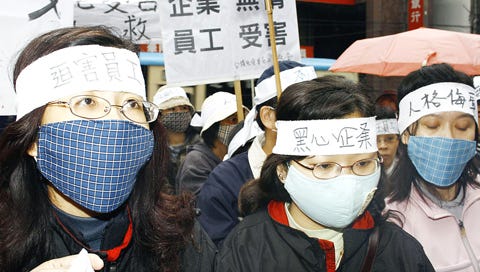The memory of layoffs reverberates for decades at TSMC
Morris Chang's autobiography shares his never-before-told experiences and business philosophy
Zero layoffs. How many companies can claim that?

In April 2009, in the narrow lane outside Morris Chang’s home, 120 TSMC former employees chanted and camped overnight:
“False elimination—real layoffs!”
“A corporate giant—lying and bullying its people!”
In 2008 Q3, revenue hit a record high of US$3 billion. In Q4, revenue dropped to US$2 billion. In Q1 2009, revenue dropped even further to US$1.13 billion.
Rick Tsai, then-CEO of TSMC, responded with layoffs without consulting the Board. In January 2009, 840 colleagues were let go on account of “poor performance.”
Jensen Huang says, instead of firing people, he prefers “torturing them into greatness.”
Nvidia’s layoff story is infamous.
On the brink of shuttering the business in 1996, Nvidia laid off more than half of its workforce and bet everything on its untested RIVA 128. That experience may well have set in stone Jensen Huang’s stance.
Morris Chang’s first encounter with layoffs occurred a mere three years (1958) into his first job, at Sylvania’s semiconductor division. Within the first year, he was promoted to head a section within the R&D department, supervising a team of four engineers.
Working at Sylvania was initially a joyful time. My engineers and I were all in our twenties, brimming with youthful enthusiasm. We were diligent, tirelessly working for the company, continuously soaking up new knowledge and experiences. To maintain a fast pace, we often worked night shifts after the day shift. To write papers, we sometimes stayed up all night.
When Sylvania’s situation worsened and the decision came to implement layoffs, Morris Chang was told to deliver the news to his team.
After two years of hard work by five young people, the reward was that two would be laid off. . . The two who were laid off were both in their first jobs. Informing them they were laid off was one of the hardest tasks of my life. Both conversations ended in tears. Both ended with the same lament: “It seems that our enthusiasm and hard work were still not enough.” The innocence of youth vanished in a single day, never to return.
When the semiconductor industry hit another downswing in 1970, leaders once again sought layoffs to the rescue. As IC Division GM and VP at Texas Instruments, Morris Chang held his ground at managers meetings where layoffs were hotly debated.
Using performance ratings would not be fair, because each supervisor had different standards for rating employees. . . Dismissing employees on that basis would invite trouble.
The only unassailable standard for a fair layoff is seniority—those most recently hired would be the first to go, at every rank.
When crisis struck again in 2009, Morris Chang knew the answer to respond to the protestors outside. Chang eventually invited all 840 employees who were laid off back to TSMC.
“TSMC employees are the company’s most important asset”; the performance evaluation system is meant to be positive and constructive. It is not, and will not be, used as a means to dismiss colleagues.
There have never been layoffs at TSMC since.
Chang argues that “performance reviews” should be changed to “job suitability and performance reviews.” It’s often a matter of simply re-assigning a colleague to a better-suited team.
This story reminded me of the layoffs at McKinsey I witnessed in spring 2023. McKinsey is another company that prides itself in “zero layoffs.” When word finally got out who was laid off, I rushed downstairs to say goodbye to colleagues and friends. Though some left in silence, others posted farewell messages on Slack about their 5-20+ year journey at McKinsey and where in the office to find them on their last days. Their faces were red and swollen from tears. Even our hugs could not stop my own tears from flowing.
“It seems that our enthusiasm and hard work were still not enough.” The innocence of youth vanished in a single day, never to return.
You’re receiving this email because we’ve met and/or had a positive interaction in the past. I will not be offended if you unsubscribe, but if you have learned something from my writing, please consider forwarding this your friends.




My innocence of youth vanished in the first year I graduated lol